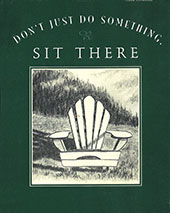The Pema Chödrön interview, above, provides wonderful insight into Pema's life and her work, including some rare glimpses into her life before becoming a Buddhist nun. In the first two segments, she touches on the importance of meditation retreats (toward the end of the first segment and into the beginning of the second).
On a meditation retreat, especially a multi-day retreat, there are times of calm and peace, but most meditation teachers will tell you that being calm and peaceful is actually not the point of a retreat, and making it a goal will result in the opposite experience. This is true also of a regular meditation practice. Practice is practice, and this means working with all states, not just the pleasant ones.
Silent retreats are an important part of many contemplative traditions and there are many retreat centers world-wide that offer them (see Retreat Opportunities). The following excerpts about retreats come from Silvia Boorstein's book, Don't Just Do Something, Sit There - A Mindfulness Retreat with Sylvia Boorstein:
Since mindfulness practice is a way of being in the world rather than a specific technique that can only be practiced on certain occasions, being on retreat seems extra. If alert, balanced presence in our lives is the goal of practice, why not practice in the midst of life rather than in seclusion?
There is a good reason. Of course the truth is available in every moment, and we could wake up to wisdom and freedom in the supermarket as well as on a meditation cushion on a retreat - but a retreat is different. There are no diversions. There is nothing to entertain ourselves with. Since there is no place to hide from ourselves, there's a good possibility that we will know ourselves better after a retreat than we did before.
But self-knowledge is only the beginning. Liberating understanding comes more from seeing how things are than how we are. Seeing the truth of the cause and the end of suffering begins to allow us to live more freely. Being alone, with no diversions, sets up ideal conditions for beginning to see...
My favorite tranquility story comes from my friend Anna, a teaching colleague at Spirit Rock Meditation Center. Long ago, during a period in which she was doing intensive meditation practice, Anna discovered a "completely new mind state": She describes being aware of its newness and its unfamiliarity, and says, "For a while, I wondered what it was. Then I realized it was calm.”
Usually when Anna describes that experience people laugh. I think the laughing is only partly caused by her witty way of telling the story. The rest, I think, comes from ruefulness. People realize they rarely feel calm...
Equanimity doesn't mean keeping things even; it is the capacity to return to balance in the midst of an alert, responsive life. I don't want to be constantly calm. The cultural context I grew up in and the relational life I live in both call for passionate, engaged response. I laugh and I cry and I'm glad that I do. What I value is the capacity to be balanced between times...
Whatever your retreat experience was, it was enough. There is absolutely no way of evaluating mindfulness practice on the spot. Feeling ecstatic, or even feeling good, is not necessarily a criterion. There are lots of ways to temporarily alter experience that aren't necessarily conducive to wisdom. On the other hand, if you are finishing your retreat feeling saddened, that's not necessarily a sign that you did it wrong. Maybe you learned an important truth that you've been hiding from yourself. That would be progress.
If you feel relaxed, that's great. But if you don't, even if you feel unnerved, it could mean you are on the way to some new understanding. You never know. Perhaps you are thinking, "Oh, I'm just now catching on to how every moment arises and disappears, and now I have to go home!" Every moment arises and disappears at home just the same as on retreat. You can go home.
My friend Sharon describes mindfulness practice by using the image of a farmer sowing a field of seeds. She says, "Seeds get thrown all over the place. Some sprout immediately, and others, because the soil isn't warm enough or wet enough, sprout later.” I used to hear Sharon's image in terms of my own garden. I'd think of the things I routinely did to prepare the soil. Meditation practice seems like ongoing soil preparation.
A big part of practice is intention. In traditional texts, intention is discussed as "inclining the mind in the direction of insight." I believe that the very act of setting aside time to practice mindfulness, just doing it, "inclines the mind."
- from Don't Just Do Something, Sit There by Sylvia Boorstein



